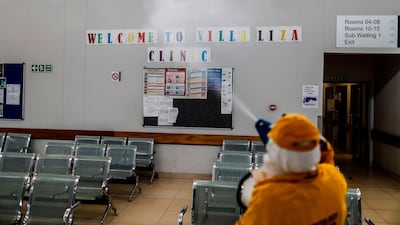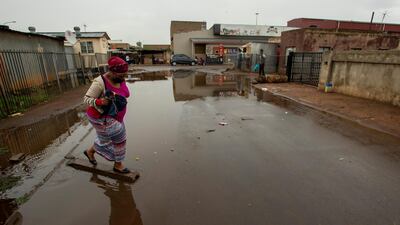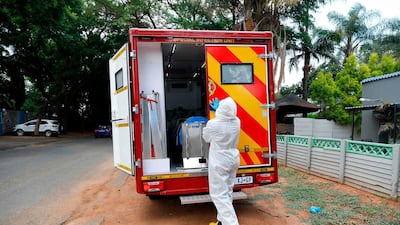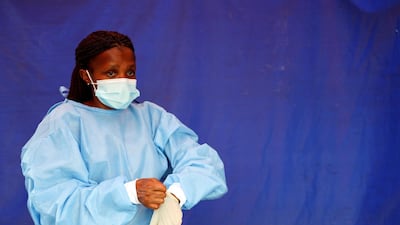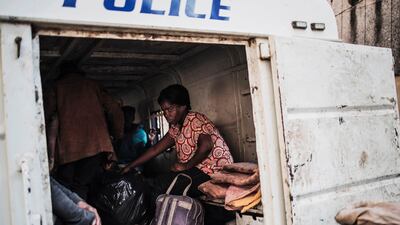Doubts cast on the effectiveness of the Oxford AstraZeneca vaccine in Europe and the US added to vaccine hesitancy in Africa, top health officials said.
Africa faces its own challenges in the fight against Covid-19 as countries struggle to inoculate remote populations scattered across the vast continent.
Mutahi Kagwe, the Kenyan Minister of Health, said a mobile registration platform used for elections was aiding the vaccine programme across the country, but said uncertainty was a problem.
“The hesitancy has to do with global stories about efficacy and what is happening elsewhere,” he said.
“When European countries stopped using the Oxford AstraZeneca vaccines, that got into people’s minds.
“The challenge is where people are doubtful about the vaccine, so there is a need for an intensive communication campaign to address that doubt.”
US health officials raised concerns that AstraZeneca may have included "outdated information" in its coronavirus vaccine trial in Peru, Chile and the United States.
The results were released to much fanfare on March 22, but one day later the US National Institute of Allergy and Infectious Diseases issued a statement claiming that the trial could have provided an "incomplete view" of the efficacy data.
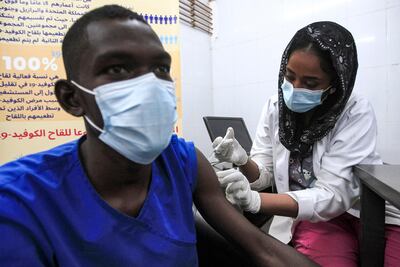
Their comments came after a number of countries, including Denmark and Norway, temporarily suspended the use of the Covid-19 vaccine in early March, after reports that a small number of people had developed clots after their injections.
A few days later the European Medicines Agency and the WHO ruled the AstraZeneca vaccine safe and effective.
The Oxford vaccine is the preferable choice for Africa, where a lack of cold-chain storage delivery networks can make it difficult to keep other Covid-19 vaccines at the very low temperatures required, in particular when transporting them to remote communities.
“Everywhere in the world you have vaccine hesitancy,” said Dr Osagie Ehanire, Nigeria's Minister of Health.
“In Nigeria, we have people who do not believe that Covid-19 exists.
"But we have enough people who do want [the vaccine], and the legacy of polio has left us with a lot of infrastructure that is suitable to accept a vaccine for Covid, with cold-storage facilities.
“We have a lot of experience in moving vaccines around the place, so hesitancy is not connected with the integrity of vaccines,” he said.
A long wait for herd immunity in Africa
Herd immunity is also likely to be significantly delayed in Africa compared with elsewhere in the world, because of a shortage of vaccines.
Of the 40 million of so jabs promised to African nations and distributed by Covax, just 12 million have arrived so far.
Also, the network of temperature-controlled delivery options is lacking, making the intervention of private businesses and wealthier nations crucial if a global vaccination programme is to be realised.
With an estimated total population of more than 1.2 billion across 54 countries, 33 of which are classified as "least developed countries", the continent presents a significant funding and logistical challenge for authorities and NGOs working to ensure equitable access to vaccines across all communities.
The challenges were raised by African government officials on the final day of the Hope Consortium's World Immunisation & Logistics Summit.
Johnson & Johnson pledged to supply 500 million doses to lower-income countries, and another quarter billion doses to shore up vaccination efforts in Africa.
It will sell the African Vaccine Acquisition Trust up to 220 million doses to start, with the option to buy another 180 million shots in the future.
But they are not expected to arrive in Africa until the third quarter of 2021.
David Hadley, chief executive of Mediclinic Middle East, a private hospital company with clinics in Africa and the UAE, said the company was trialling the Johnson & Johnson single dose vaccine in the hope it could help accelerate vaccine delivery on the continent.
“It would be fantastic to get into the markets as soon as possible,” he said.



























